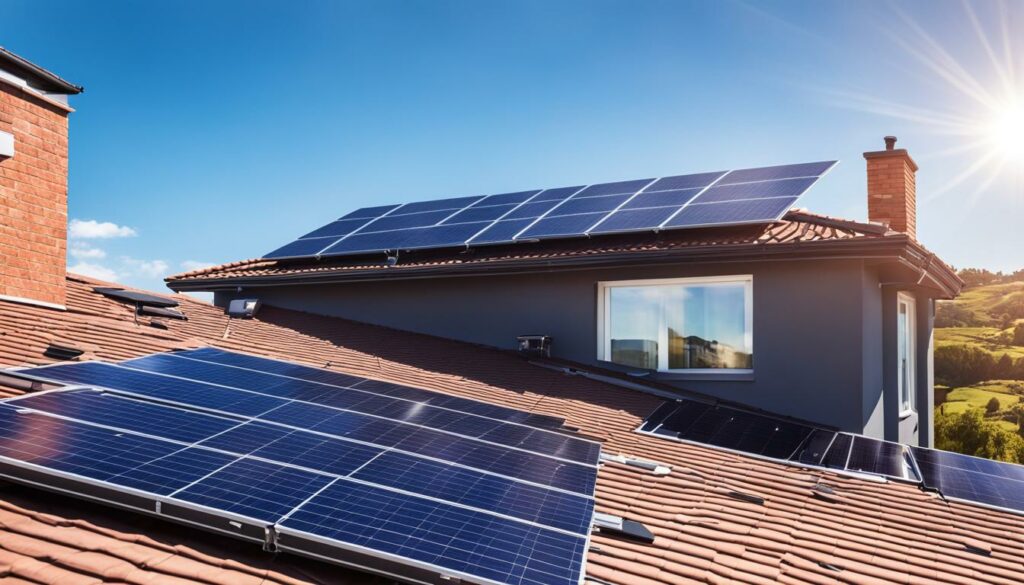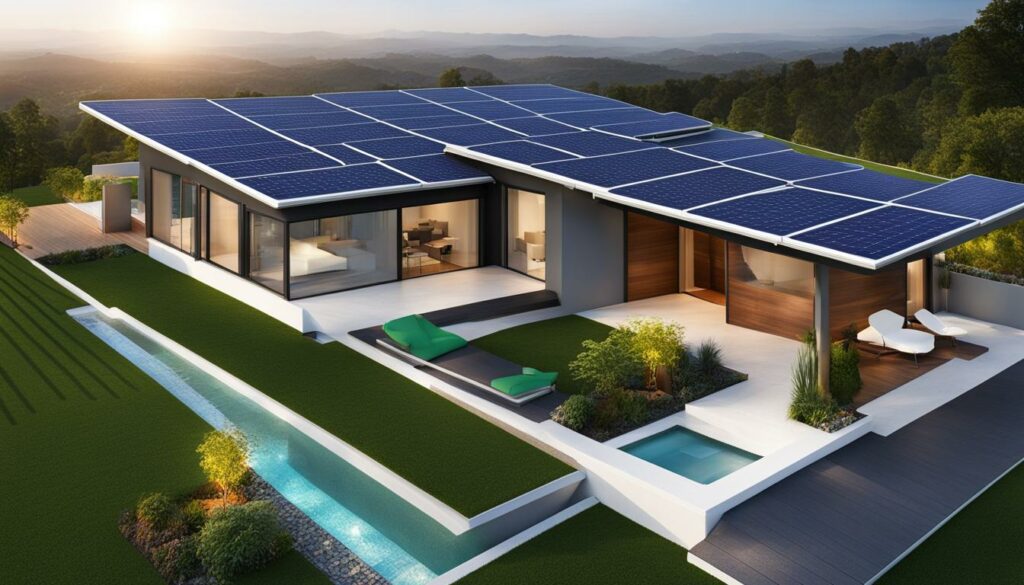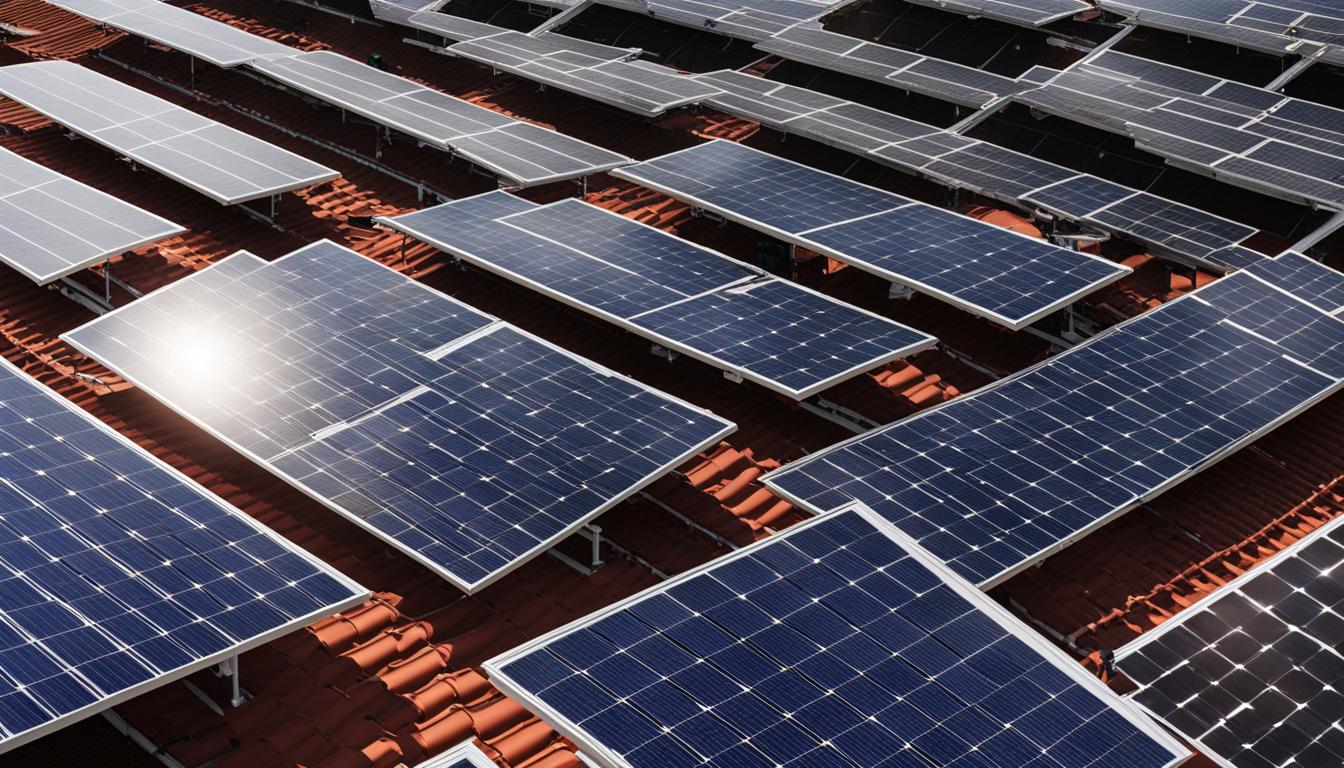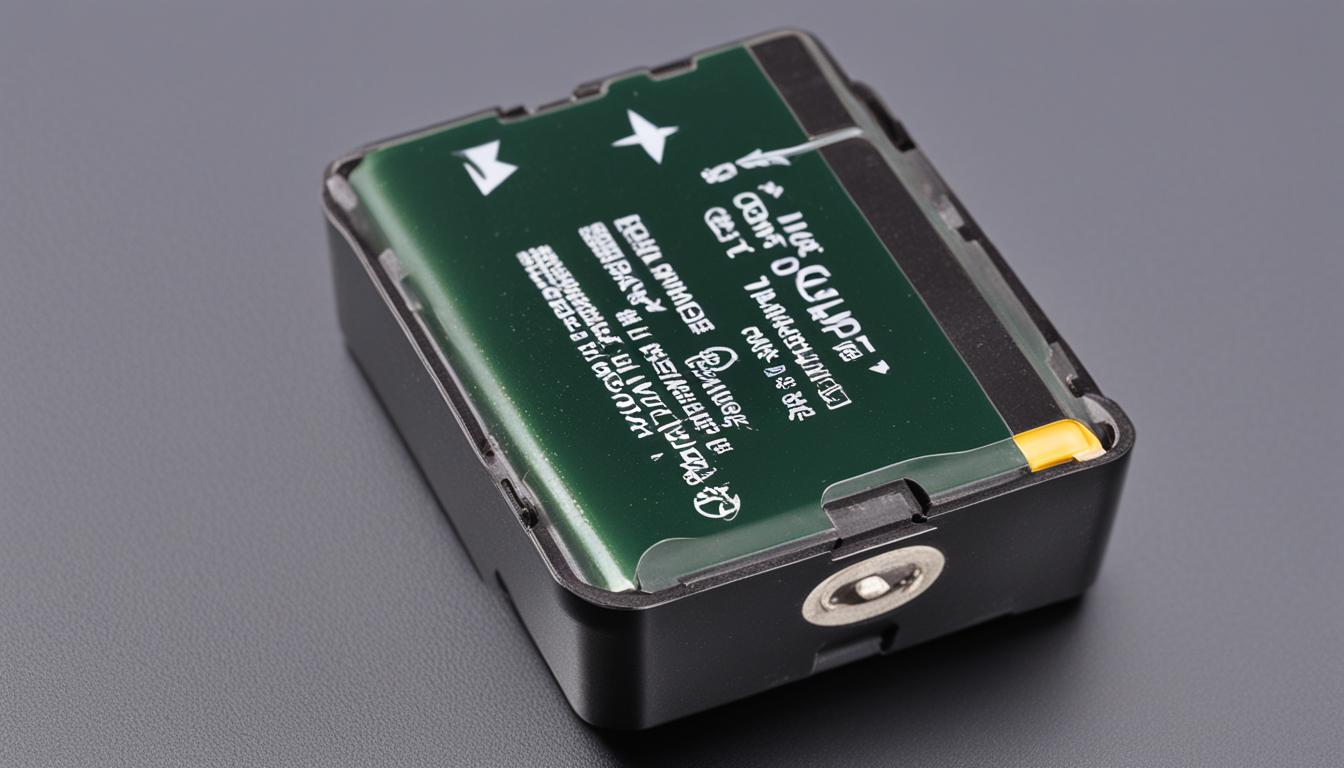Welcome to our guide on AC coupling, a technique that can enhance the efficiency and reliability of your solar power system. Whether you have a grid-tied or off-grid system, AC coupling offers a range of benefits that can optimize the performance of your solar setup. In this article, we will explore the ins and outs of AC coupling, its advantages and disadvantages, and help you make an informed decision for your solar power needs.
If you’re looking to maximize the functionality of your solar power system and add battery backup capabilities, AC coupling is a technique you need to know about. By incorporating a hybrid inverter into your solar system, AC coupling allows for the seamless integration of battery storage, opening up a world of possibilities for energy management.
Key Takeaways:
- AC coupling is a technique that enhances the efficiency and reliability of solar power systems.
- It involves the addition of a hybrid inverter to integrate battery backup capabilities.
- AC coupling is commonly used in both grid-tied and off-grid solar systems.
- It offers advantages such as simplified wiring and compatibility with microinverters and optimizers.
- However, AC coupling has slightly lower battery charging efficiency compared to DC coupling.
Understanding AC Coupling in Solar Grid-Tie Systems
In a grid-tie solar power system with battery backup, AC coupling plays a crucial role in optimizing energy efficiency and reliability. By incorporating a hybrid inverter, we can seamlessly connect the solar system to the grid, enabling the charging of batteries using solar power, grid power, or even a generator. This combination of AC coupling and battery backup ensures that your home remains powered even during grid outages or when solar energy production is low.
AC coupling offers several advantages in a grid-tie solar system. Firstly, it eliminates the need for a separate charge controller, simplifying the installation process and reducing costs. Additionally, AC coupling allows for the utilization of existing DC wiring, further streamlining the setup.
When the grid goes down, the hybrid inverter automatically disconnects the system from the grid, ensuring the stored solar or battery power is used to supply critical loads in your home. This automatic switchover ensures continuous power supply, giving you peace of mind during unexpected power outages.
Although AC coupling offers significant benefits, it’s important to note that it comes with a slight trade-off in battery charging efficiency when compared to DC coupling. The multiple inversions involved in AC coupling can result in minimal energy losses during the charging process.
However, the lower charging efficiency can be mitigated with proper system sizing, ensuring that the hybrid inverter and battery bank are appropriately matched to meet your energy needs.
Now that we understand the basics of AC coupling in solar grid-tie systems, let’s explore the advantages and disadvantages of this approach in more detail. To provide a comprehensive overview, we’ve created a table that highlights the key factors to consider:
| Advantages of AC Coupling | Disadvantages of AC Coupling |
|---|---|
| Simplified installation | Slightly lower battery charging efficiency compared to DC coupling |
| Compatibility with microinverters and optimizers | Requires appropriate system sizing to optimize efficiency |
| Allows use of existing DC wiring |
While AC coupling offers simplified installation and compatibility with various system components, it’s essential to weigh these advantages against the lower battery charging efficiency. By carefully evaluating your specific needs and considering the pros and cons, you can determine whether AC coupling is the right choice for your grid-tie solar power system with battery backup.
Advantages of AC Coupling for Battery Backup Systems
When it comes to battery backup systems for solar power, AC coupling offers several advantages. Let’s explore the key benefits:
- No Need for a Separate Charge Controller: AC coupling eliminates the need for a separate charge controller, simplifying the system and reducing costs.
- Utilize Existing DC Wiring: AC coupling allows for the use of existing DC wiring, which reduces installation time and expenses.
- Built-In Flexibility: AC coupling offers compatibility with a wide range of solar panels, inverters, and battery technologies, providing flexibility in system design and expansion.
However, it’s important to note that AC coupling has slightly lower battery charging efficiency compared to DC coupling. This means that the hybrid inverter and battery bank may need to be oversized to compensate for the lower efficiency.
“AC coupling simplifies the system and reduces costs by eliminating the need for a separate charge controller.”
Ensuring optimal battery charging efficiency is crucial for maximizing the performance of a battery backup system. While AC coupling offers certain advantages, the slightly lower efficiency compared to DC coupling should be considered in system design and sizing.
Efficiency Comparison: AC Coupling vs. DC Coupling
| AC Coupling | DC Coupling | |
|---|---|---|
| Battery Charging Efficiency | Slightly lower | Higher |
| Charge Controller Required | No | Yes |
| DC Wiring | Utilizes existing wiring | May require additional wiring |
The efficiency comparison between AC coupling and DC coupling clearly shows that DC coupling offers higher battery charging efficiency. However, the decision between the two depends on factors such as budget, system requirements, and existing infrastructure.
Disadvantages of AC Coupling for Battery Backup Systems
While AC coupling offers several advantages for battery backup systems, it also has a few disadvantages. The primary disadvantage is lower battery charging efficiency compared to DC coupling. In AC-coupled systems, the stored solar electricity needs to be inverted three times before it can be used by home appliances, which results in efficiency losses. This means that the hybrid inverter and battery bank may need to be oversized to compensate for the lower efficiency.
“AC coupling, although advantageous in various aspects, does come with a trade-off in terms of battery charging efficiency,” says John Williams, a solar energy expert from SolarTech Solutions. “The multiple inversions from DC to AC and back to DC can introduce losses, affecting the overall performance of the system. To counteract this, it’s important to carefully size the hybrid inverter and battery bank to ensure adequate charging and storage capacity.”
While AC coupling remains a popular choice for battery backup systems due to its simplicity and compatibility with existing DC wiring, potential buyers should consider the trade-offs involved. The lower battery charging efficiency may require additional upfront investment in larger inverters and battery banks. However, for homeowners looking to retrofit storage to an existing solar system, the advantages of AC coupling often outweigh the disadvantages, making it a viable option to enhance their energy resilience.
AC-Coupled vs. DC-Coupled Solar + Storage Systems
When it comes to configuring solar panels, batteries, and inverters in a solar + storage system, you have two main options: AC coupling and DC coupling. Let’s explore the differences and advantages of each.
AC Coupling
AC coupling involves converting the DC power generated by solar panels into AC power before storing it in the battery. This is achieved through a hybrid inverter that connects the solar system to the grid. AC coupling has been widely used, especially for retrofitting battery backup to existing solar systems. It offers the advantage of compatibility with microinverters and optimizers, making it a flexible option for various setups.
DC Coupling
In contrast, DC coupling allows for a direct connection between the solar panels and the battery. This means the power generated by the panels is stored in the battery without the need for an additional conversion step. DC coupling offers higher overall efficiency compared to AC coupling, as there is no energy loss during the inversion process. However, it is more complex to install and requires careful integration to ensure proper functioning of the system.
To help you better understand the differences between AC coupling and DC coupling, let’s summarize their key attributes in a table:
| AC Coupling | DC Coupling |
|---|---|
| DC power from solar panels converted to AC | Direct connection of solar panels to battery |
| Compatible with microinverters and optimizers | Higher overall efficiency |
| Commonly used for retrofitting battery backup | More complex installation |
As you can see, both AC coupling and DC coupling have their own advantages and considerations. The choice between the two depends on your specific needs and priorities. If you already have a solar system and want to add energy storage, AC coupling may be the most straightforward option. However, if you’re installing a new system with both solar panels and a battery, DC coupling can offer higher overall efficiency.
Efficiency of AC-Coupled vs. DC-Coupled Solar Batteries
The efficiency of solar batteries is an important consideration when choosing between AC coupling and DC coupling. AC-coupled systems require the conversion of electricity from DC to AC and then back to DC before it can be used, which leads to some efficiency losses. In contrast, DC-coupled systems only require a single inversion, resulting in higher overall efficiency.
DC-coupled systems are more efficient in converting incoming electricity into stored electricity and back to usable electricity. This means that more of the energy produced by the solar panels is effectively stored and utilized. The roundtrip efficiency, which measures how much electricity is lost during charging and discharging, is a key factor to consider when comparing AC and DC coupling.
“DC-coupled systems have higher overall efficiency compared to AC-coupled systems. This is due to the reduced number of inversions required, resulting in less energy loss during the conversion process.”
To better illustrate the efficiency difference between AC-coupled and DC-coupled systems, let’s take a look at the following table:
| System Type | Roundtrip Efficiency |
|---|---|
| AC-Coupled | 80% |
| DC-Coupled | 90% |
As shown in the table, DC-coupled systems typically have a higher roundtrip efficiency compared to AC-coupled systems. This means that more energy is effectively stored and available for use in a DC-coupled system. However, it’s important to consider other factors such as system design, installation requirements, and cost when making a decision between AC and DC coupling.
Installation Considerations for AC-Coupled Solar Batteries
When it comes to retrofitting storage to an existing solar system, AC coupling offers significant installation advantages. One of the key benefits is the ability to utilize the existing solar inverter system, eliminating the need for extensive rewiring and reducing upfront installation costs. This makes AC coupling an attractive option for homeowners who already have a solar array installed and are looking to add energy storage.
By leveraging the existing solar inverter system in an AC-coupled configuration, homeowners can seamlessly integrate battery storage without the need for additional equipment. This not only simplifies the installation process but also minimizes the upfront investment required. With AC coupling, you can tap into the power of energy storage to enhance the performance and reliability of your solar power system without breaking the bank.
However, it’s important to consider that AC coupling may not offer the same level of overall efficiency as a DC-coupled system. If you are installing new solar panels alongside a battery storage system, a DC-coupled solution may provide higher efficiency. However, it’s worth noting that opting for a DC-coupled system can result in increased upfront installation costs and complexity.
When deciding between AC and DC coupling, it’s crucial to evaluate your specific needs and the characteristics of your solar + storage installation. Consider factors such as existing infrastructure, potential energy savings, and your budget. Consulting with a solar energy professional can provide valuable insights and help you make an informed decision that aligns with your goals.

Key Installation Considerations for AC-Coupled Solar Batteries:
- Utilize existing solar inverter system
- Minimize the need for rewiring
- Reduce upfront installation costs
- Evaluate overall system efficiency
- Consider the complexity of installation
- Consult with a solar energy professional
Considerations for Choosing AC- or DC-Coupled Systems
When deciding between AC and DC coupling for your solar panels and battery storage system, there are several factors to consider. If you already have a home solar array installed and wish to add energy storage as a retrofit, AC coupling is likely the best choice. It allows you to utilize the existing solar inverter system, reducing installation complexity and costs. However, if you are installing solar panels and a battery storage system together, a DC-coupled system may offer better overall performance.
A DC-coupled system provides higher efficiency as it allows for a direct connection between the solar panels and the battery, minimizing energy losses during conversion. This can result in better energy utilization and increased savings over time. However, it is essential to consider that DC-coupled systems often have higher upfront installation costs compared to AC-coupled systems.
Here’s a summary of the key considerations:
- If you are retrofitting energy storage to an existing solar system, AC coupling is recommended to leverage your current solar inverter system.
- If you are installing solar panels and a battery storage system simultaneously, a DC-coupled system may offer higher overall performance and efficiency.
- However, keep in mind that DC-coupled systems typically come with higher upfront installation costs.
| Considerations | AC Coupling | DC Coupling |
|---|---|---|
| Installation | Simple retrofit if you already have a solar array installed | More complex, especially when installing new solar panels |
| Performance | Slightly lower efficiency | Higher efficiency |
| Upfront Costs | Lower installation costs | Higher installation costs |
Ultimately, the choice between AC and DC coupling depends on your specific circumstances and priorities. If you need assistance in selecting the most suitable option for your solar + storage installation, consult with a solar energy professional who can provide expert guidance tailored to your needs and goals.
Shopping for a Solar Battery: AC Coupled vs. DC Coupled
When shopping for a solar battery, it’s important to consider whether it requires a separate inverter or comes with a built-in inverter. AC-coupled batteries typically require a separate inverter, while some DC-coupled batteries have built-in inverters. The presence of a built-in inverter affects the efficiency rating of the battery. It’s important to compare efficiencies at every step, from the electricity produced by the solar panels to the AC electricity pulled from the battery for use. This will provide a more accurate comparison between AC- and DC-coupled systems.

When comparing AC and DC coupling for solar batteries, several factors should be considered:
- Efficiency Rating: AC-coupled batteries may have lower efficiency ratings compared to DC-coupled batteries due to the extra conversion steps involved. This can impact the overall performance of the system.
- Inverter Compatibility: AC-coupled batteries require a separate inverter, which adds complexity to the system and may require additional installation costs. DC-coupled batteries with built-in inverters eliminate the need for a separate inverter, simplifying the installation process.
- Cost: The presence of a built-in inverter in DC-coupled batteries can affect the cost. While AC-coupled batteries may have a lower upfront cost, the additional expenses for a separate inverter should be taken into account.
By carefully considering these factors, you can make an informed decision when choosing between AC and DC coupling for your solar battery. It’s essential to prioritize the aspects that are most important to you, whether it’s maximizing efficiency, simplifying installation, or minimizing costs.
Conclusion
In conclusion, AC coupling offers several advantages for enhancing your solar power system. One of its key benefits is simplified installation, making it a popular choice for retrofitting battery backup to existing solar systems. AC coupling is also compatible with microinverters and optimizers, allowing for optimized energy production and greater flexibility with system design. Additionally, AC coupling enables you to rely on the grid for additional charging, providing a reliable backup power source.
However, it’s important to note that AC coupling has a slight drawback of lower battery charging efficiency compared to DC coupling. This is due to the additional conversions required from DC to AC and back to DC. On the other hand, DC coupling offers higher overall efficiency by directly connecting the solar panels to the battery, minimizing energy losses.
When choosing between AC- and DC-coupled systems, it’s crucial to consider your specific needs and the specifics of your solar + storage installation. If you already have a solar array installed and want to add energy storage, AC coupling may be the best option due to its simplified installation process and compatibility with existing equipment. However, if you are installing a new solar system and battery storage simultaneously, DC coupling may provide higher overall efficiency, although it may come with increased upfront costs.
To make an informed decision and choose the most suitable option for your solar + storage system, we highly recommend consulting with a solar energy professional. They can assess your specific requirements, evaluate the technical aspects, and provide expert guidance to help you optimize your solar power system for maximum efficiency, reliability, and cost-effectiveness.
FAQ
What is AC coupling?
AC coupling is a technique used to enhance the efficiency and reliability of a solar power system. It involves adding a hybrid inverter that serves as the interface between the solar system and the grid.
How does AC coupling work in a grid-tie solar system with battery backup?
AC coupling in a grid-tie solar system with battery backup involves the addition of a hybrid inverter that connects the solar system to the grid. This allows for the charging of batteries using either solar power, grid power, or even a generator. In the event of a grid outage, the hybrid inverter automatically disconnects the system from the grid and uses the solar or battery power to supply critical loads.
What are the advantages of AC coupling for battery backup systems?
One of the primary advantages of AC coupling is that it eliminates the need for a separate charge controller, simplifying the system and reducing costs. AC coupling also allows for the use of existing DC wiring, further reducing installation time and expenses.
What are the disadvantages of AC coupling for battery backup systems?
The main disadvantage of AC coupling is lower battery charging efficiency compared to DC coupling. Since the stored solar electricity needs to be inverted three times before it can be used by home appliances, there are efficiency losses. This means that the hybrid inverter and battery bank may need to be oversized to compensate for the lower efficiency.
What is the difference between AC-coupled and DC-coupled solar + storage systems?
AC coupling involves inverting the DC power from solar panels into AC power before storing it in the battery, while DC coupling allows for direct connection of the solar panels to the battery. AC coupling is commonly used for retrofitting battery backup to existing solar systems, while DC coupling offers higher efficiency but is more complex to install.
Which is more efficient, AC-coupled or DC-coupled solar batteries?
DC-coupled systems are generally more efficient than AC-coupled systems because they require fewer inversions of electricity. AC-coupled systems invert the electricity from DC to AC and back to DC before it can be used, resulting in efficiency losses.
Is AC coupling or DC coupling better for retrofitting storage to an existing solar system?
AC coupling is often the better option for retrofitting storage to an existing solar system because it allows for the use of the existing solar inverter system, reducing the need for rewiring and lowering upfront installation costs.
What factors should be considered when choosing between AC- and DC-coupled systems?
When choosing between AC- and DC-coupled systems, factors to consider include whether you already have a solar array installed (AC coupling may be better for retrofitting), whether you are installing solar panels and a battery storage system simultaneously (DC coupling may offer higher efficiency), and the associated upfront installation costs.
What should I consider when shopping for a solar battery?
When shopping for a solar battery, it’s important to consider whether it requires a separate inverter or comes with a built-in inverter. AC-coupled batteries typically require a separate inverter, while some DC-coupled batteries have built-in inverters. The presence of a built-in inverter affects the efficiency rating of the battery.










